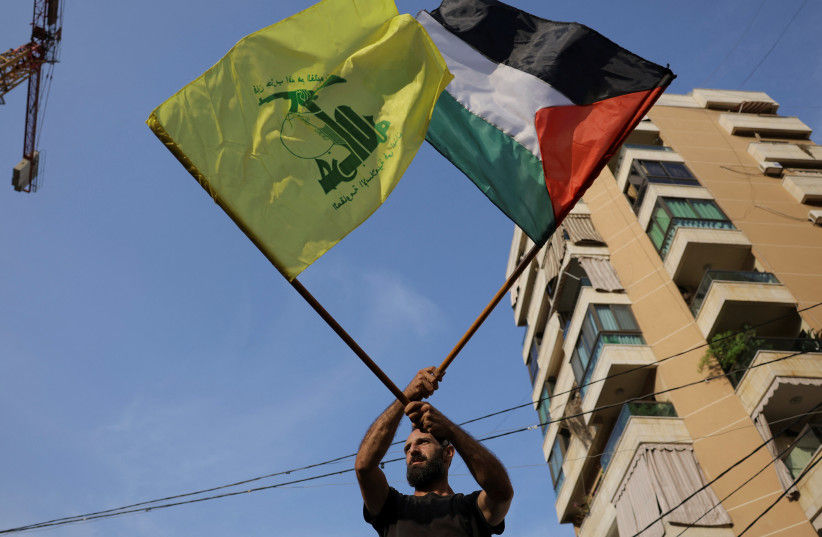Hezbollah leader Hassan Nasrallah gave a speech on Friday, his first major address since the Hamas attack on Israel on October 7. Nasrallah is one of the key leaders of Iranian proxy groups in the region. His speech was closely watched in Lebanon, the region, and the West to see if he would announce an escalation against Israel.
Since October 7, Hezbollah has been attacking Israel every day with rockets, mortars, gunfire, and anti-tank missiles. Nasrallah's speech was important because it reflected his ability to threaten Israel and keep the region in suspense. It also illustrated how Hezbollah, a terrorist organization that has bankrupted and ruined Lebanon, is able to manipulate and threaten millions of people.
Hezbollah has stockpiled 150,000 missiles over the past decades. In 2012, it intervened in the Syrian civil war on the side of the Assad regime and Iran. Its terrorists then entered Syria and suppressed the Syrian people. Hezbollah's operations in Syria revealed how it has become much stronger than Lebanon and in fact projects its power far beyond Israel’s northern neighbor – for example, through money laundering and operations in Africa and South America.
Hezbollah's threats to Israel are not new.
The group has attacked Israel in the past, including in 2006, when it carried out an attack on the border that resulted in the deaths of Israeli soldiers and the kidnapping of two soldiers by Hezbollah, prompting the Second Lebanon War.

The kidnapping attacks by Hezbollah are part of a broader Iranian strategy in the region. For example, Hamas also attacked Israel in 2006 and kidnapped Israeli soldier Gilad Shalit. Hezbollah and Hamas have been learning from one another for decades, and their decision-making is linked, as is their relationship with Iran. The weapons used by the two groups also have commonalities. They are part of the Iranian octopus of threats.
Nasrallah's speech was widely seen as a possible turning point. If he had used it to inflame the region and declare more attacks on Israel, it could have led to the opening of a second front against Israel. Israel had warned Hezbollah not to provoke and not to carry out more attacks. Israel's leaders have signaled over the years that Hezbollah threats could have a serious impact on Lebanon – in other words, that any war would harm Hezbollah but also bring destruction to Lebanon, which cannot afford that destruction. The country is already bankrupt and has been ruined by Hezbollah. It doesn't need more conflicts. Hezbollah has been cautioned to see what is happening in Gaza and not take risks.
Hezbollah will wait
It appears that, for now, Nasrallah is indeed being cautious. The concern that his speech could lead to a major war has now worn off. It appears that Hezbollah will wait. This is not necessarily enough for Israel because Hezbollah feels it has impunity to launch smaller attacks and receive a proportional response. For example, a rocket fired from Lebanon landed in Kiryat Shmona last week. Israel has evacuated Kiryat Shmona and 40 other communities in the north. The evacuees do not know when they will go home.
Hezbollah is watching this carefully. It knows that its limited attacks have caused Israel to withdraw civilians from the border. Hezbollah had already been engaging in this kind of escalation since last year. For example, it had threatened Israel into signing a maritime deal with Lebanon. That deal was supposed to reduce tensions. Instead, it's obvious now that Hezbollah is not deterred. Instead, it is trying to dictate the time and place of expanded fighting.
Nevertheless, it is clear that Nasrallah is worried about any potential escalation. His speech was perceived in the region as a climb-down. It illustrates that Hezbollah may be weakening in terms of its calculations that war with Israel will be a success. It appears to want to distance itself from the Hamas massacre of 1,400 Israelis. Hamas's brutality and genocidal evil have now been revealed. Hezbollah sought to emphasize that the Hamas attack was planned by Hamas without Nasrallah or other parts of the Iranian proxy-octopus knowing about the attack in advance. This is messaging by Hezbollah to portray Hamas as being responsible for the war it has brought on Gaza.
